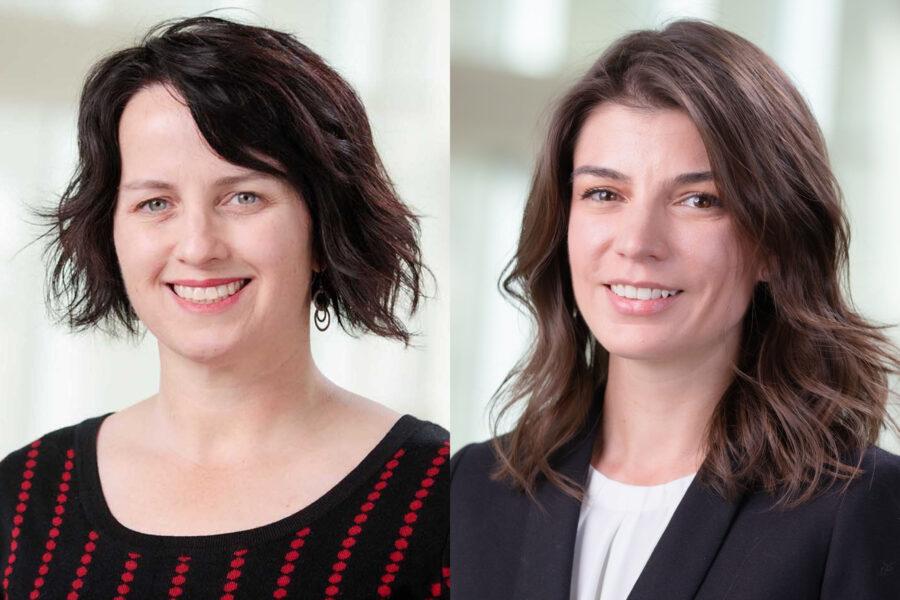As advances in machine learning and artificial intelligence rapidly rise in importance and impact, UNMC has called together a task force, crossing the campus and key clinical partners, to understand AI’s implications for the university.
Co-chaired by Emily Glenn, dean of the McGoogan Health Sciences Library, and Rachel Lookadoo, JD, assistant professor of epidemiology in the UNMC College of Public Health, the task force is considering the ways that UNMC must continue to prepare for, react to and lead with regard to the advances in AI.
AI already is having far-reaching implications for college campuses across the country – and continues to provide even more opportunities for UNMC as an academic medical center.
UNMC leadership has charged five subcommittees with investigating the ways that AI could impact UNMC:
- Enhance learning: Co-chairs Kendra Schmid, PhD, assistant dean of graduate studies, and Tammy Webster, PhD, assistant dean for academic affairs, UNMC College of Allied Health Professions.
- Enhance research: Co-chairs Rusty McCulloh, MD, UNMC associate vice chancellor for clinical research, and Jordan Rowley, PhD, assistant professor, UNMC Department of Genetics, Cell Biology and Anatomy.
- Enhance care: Co-chairs Scott Raymond, chief information and innovation officer, UNMC and Nebraska Medicine, and Chad Vokoun, MD, division chief for hospital medicine.
- Enhance business functions: Co-chairs Anne Barnes, UNMC vice chancellor for business and finance, and Sarah Gloden Carlson, JD, assistant vice chancellor and director for human resources.
- Combatting AI use in disinformation and misinformation, bias in AI: Co-chairs James Lawler, MD, associate director of international programs and innovation, UNMC Global Center for Health Security, and Abbey Lowe, PhD, assistant professor, UNMC Department of Allied Health Professions Education, Research and Practice.
“AI is no longer a distant future technology,” Lookadoo said. “It is widely used across professional sectors and has become a commonplace tool for the general public. This technology is already having profound impacts on the provision of higher education and clinical care.”
As AI becomes an increasingly ubiquitous force, Lookadoo said, it’s critical that UNMC leads the way in harnessing the potential power that the technology can yield in academic, research and clinical settings.
Lookadoo said the AI task force is focused on seeking a “balanced approach” to AI, with an equal emphasis on exploring the innovative opportunities for growth and transformation through its use, as well as mitigating the potential risks involved.
Glenn said the diverse task force gives UNMC a chance to develop a knowledge community around AI in the academic health sciences.
“The teams are providing a holistic look at where we are now and how we can adapt to AI in our landscape,” Glenn said. “Responding to and leading through disruptive, evolving technology requires expertise to be nested in many campus areas so that we can be aware of all risks and opportunities.”
Dele Davies, MD, senior vice chancellor for academic affairs, said the UNMC campus leadership created the task force and working groups of thought leaders on campus, led by Glenn and Lookadoo, to research and provide clear strategies on how to utilize AI at UNMC, Nebraska Medicine and key partners such as Children’s Hospital & Medical Center.
“While AI has been around for years,” Dr. Davies said, “the field has grown exponentially in the past few years and is already impacting many areas of our mission, including education, research, clinical care, community engagement and economic development in both positive and negative ways.”
He added, “Our intent is understanding how AI can enable us to augment all areas of our operations and put strategies in place to minimize risk. The task force is a critical first step towards this goal.”
Med center leaders Dr. Gold, Nebraska Medicine CEO James Linder and Dr. Davies led the initial meeting on the issue July 29, charging the group on their mission.
A few of the guiding questions that Dr. Davies presented to the task force included:
- What should be allowed and disallowed uses of AI in and out of the classroom setting?
- How can AI be used to help improve our predictive analytics for research success or point out areas of opportunity within our research portfolio?
- How can UNMC tap into AI for combating misinformation in our communities and the general public?
One of the overall goals from campus leadership is integrating AI into the main areas of UNMC’s mission. The product of the AI discussions also will help direct UNMC’s strategic planning for the coming year as the “big rock” for those planning efforts.
“Change is happening all around us with the growth of advanced AI, and we as an academic medical center must keep up with that change” Chancellor Jeffrey P. Gold, MD said. “Our AI task force is bringing together great minds from the med center to study the impact in the areas of education, research and clinical care, along with our business functions and the field of AI-generated misinformation.
“We will become well-grounded on these issues and make sure to incorporate them into UNMC’s mission and strategic planning process as we step into this new future.”
Currently, 64 people are serving on the task force, representing all UNMC colleges, many of UNMC’s business units and UNMC’s clinical partner Nebraska Medicine.
Subcommittee reports to Drs. Gold and Davies are scheduled for October. Afterwards, task force co-chairs will work on setting campus-wide goals around AI, and the overall discussions will flow into the 2024 strategic planning process.
